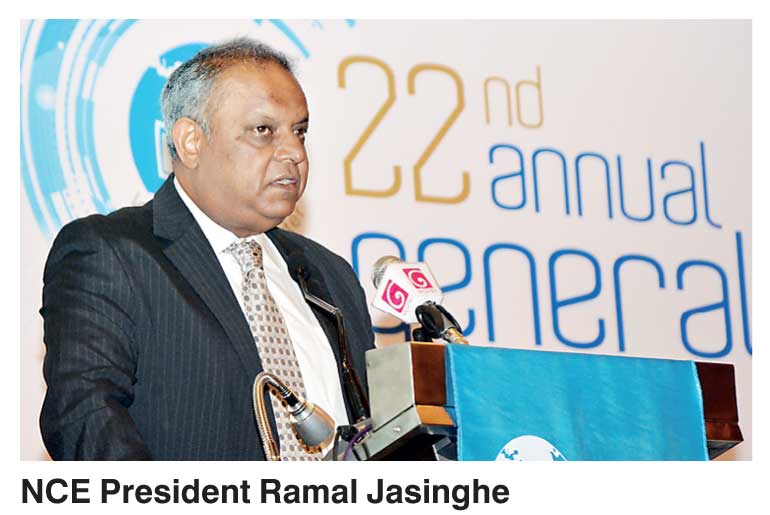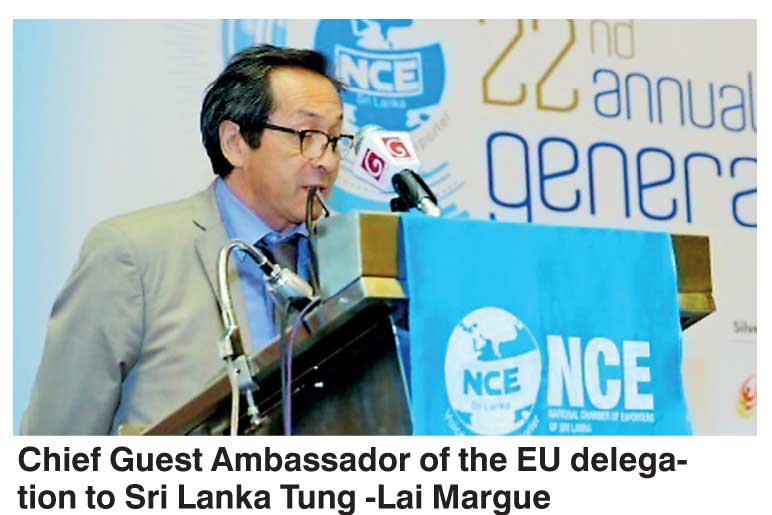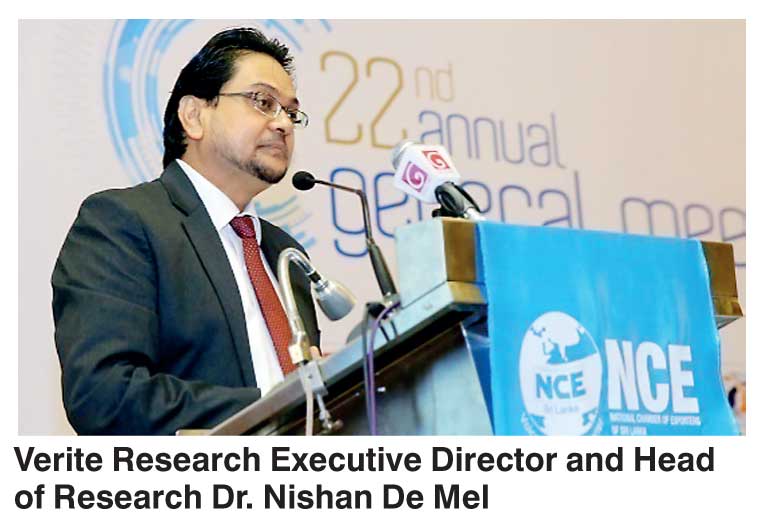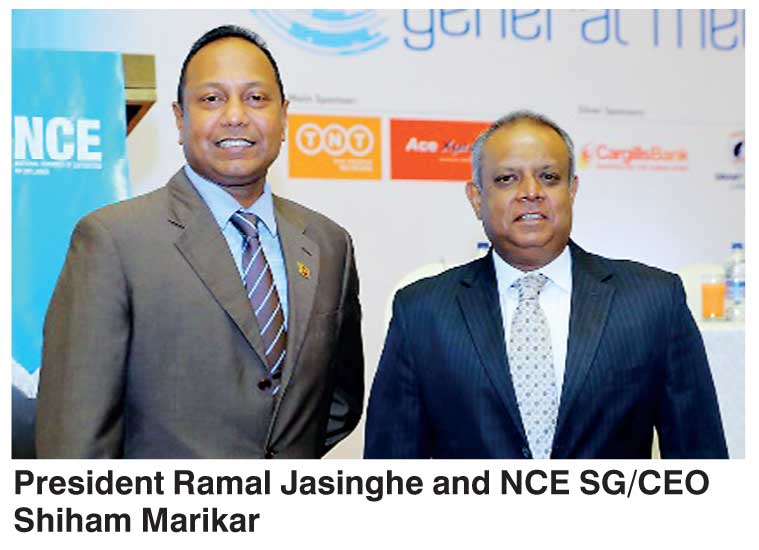Friday Feb 27, 2026
Friday Feb 27, 2026
Thursday, 26 January 2017 00:01 - - {{hitsCtrl.values.hits}}
 NCE conducted its 22nd AGM on 17 January 2017 at the Grand Ballroom of Hotel Galadari in Colombo, amidst its member exporters and distinguished invitees. The official business of the AGM comprised election of Office Bearers for the year 2017, Members of the Council which is the policy making body, and Sectoral Heads in the Council to lead the various Products and Services sectors of member exporters to represent issues related to their sectors.
NCE conducted its 22nd AGM on 17 January 2017 at the Grand Ballroom of Hotel Galadari in Colombo, amidst its member exporters and distinguished invitees. The official business of the AGM comprised election of Office Bearers for the year 2017, Members of the Council which is the policy making body, and Sectoral Heads in the Council to lead the various Products and Services sectors of member exporters to represent issues related to their sectors.
Ramal Jasinghe was elected as the President of NCE. He has been involved with the Chamber since 1997 as a Council member, thereafter moving along the ranks as Asst. Treasurer/Treasurer/Asst. Secretary/ Secretary, and finally as Vice President, having served in the Management Committee as well.
In his address he underscored the valuable role played by the Past Presidents who have guided the destiny of the Chamber, and looked forward to their continued guidance in the future to realise the goals of the Chamber, to enhance services for the wellbeing, and best interests of the membership.
He proposed to strengthen the efficiency and relevance of the Chamber, to the membership and stakeholders, by professionalising its human resources to implement the planned work program, with the objective of carving out a special place for the Chamber, incorporating information technology to the best possible extent, to keep abreast of modern trends in disseminating information and knowledge.
He also proposed to engage in a program of work to enhance the image of the Chamber amongst the members, as well as stake holders, by implementing new activities that will benefit members, and facilitate the elevation of the Chamber to a higher professional level.
Outlining the current export scenario, he stated that in 2015 earnings from exports declined by 5.6% to $ 10.5 billion year on year compared to 2014 led by a drop in agricultural and industrial exports, largely reflecting the downward movement of International Commodity Prices and the slower growth in large economies which are Sri Lanka’s major export destinations. This trend continued in 2016 with the statistics up to July revealing a further drop of 4.1% compared to the corresponding period up to July 2015. 
Although imports also contracted by 2.5% in 2015, due to lower commodity prices, and a drop in imports of capital goods, the deficit in the trade balance continues to expand. He added that in this backdrop of the declining trend in exports as a percentage of the GDP from around 33% to 17% over the last decade, the achievement of the national export target of $ 30 billion by 2020 is a huge challenge that requires effective contributions by all stake holders, and saw a pivotal role for the Chamber to play in this scenario.
He stated that the primary duty of the Chamber is to play a complementary role to the efforts of the Government and relevant State Institutions for the promotion and development of exports to accelerate economic development, and added that for this purpose Export Policy Formulation and Development is of prime importance which is urgently required.
In this context the Chamber was already actively engaged with the Ministry of Strategy Development and International Trade in the formulation of the National Trade Policy as well as with negotiations of the proposed Trade Agreements with India, China and Singapore. Forums with members have already been conducted to discuss the concerned issues.
He further stated that the Chamber will continue to discuss at the Council important Sectoral Issues that need the attention of the state authorities to facilitate exports. In this regard the Chamber is currently actively engaged with the Government, to resolve bottlenecks related to implementation of the Revenue Administration Management Information System (RAMIS), and the abolition of the current SVAT system. 
He thereafter outlined the activities he proposed to give leadership to the Chamber.
In conclusion the New President stated that he will endeavour with the assistance of his colleagues in the Council and Management Committee, to work with the relevant state authorities, to try and obtain for the chamber a suitable premises for long term lease, or at least a piece of land on long term lease, to house the facilities and services of the chamber in a conducive location, since this is a constraint at present for the Chamber to enhance its services to exporters in an effective manner, and reiterated that the Chamber will be vigilant, alert and active to respond constructively to changes in Government Policy and Proposals.
The newly appointed President stated that he will utilise the skills and strengths of the current staff of the Chamber and particularly the leadership provided by the Secretary General Shiham Marikar, and the expertise of the Consultant Geoffrey Tillekeratne, in assisting and guiding the activities of the Chamber with their professional knowledge.
The Secretary General Shiham Marikar in his brief remarks assured the new President his commitment and support, by providing leadership to the Secretariat Staff of the Chamber, to achieve the objectives of the work program outlined in his address. To facilitate this task he proposed to prepare a grid covering the work program with Key Performance Indications (KPIs) for each activity, along with responsibilities and tasks for each staff member to monitor successful implementation.
The Chief Guest at the event was Ambassador of the EU delegation to Sri Lanka Tung-Lai Margue. In his address he stated that the EU continues to be an important trading partner for Sri Lanka as the number one Export Partner and the second largest Import Partner. In 2015 Sri Lanka’s Exports to the EU were 2.6 billion Euro while Imports were 2.1 billion Euro. Garments continued to dominate Sri Lanka’s Exports to the EU, wherein the EU imported 1.6 billion Euro worth of Garments which represented 63% of Sri Lanka’s total exports to the EU.
He further stated that Sri Lanka by closely working together with the EU has brought tangible results for trade related issues. Firstly, the new EU funded  trade related Technical Assistance Project worth 8 million Euro will enhance the efficiency of cross border procedures, and the capacity of SMEs to comply with the rules and procedures when exporting to SAARC countries, and EU Markets; Secondly lifting of the ban of fisheries products; and thirdly the progress achieved with the GSP+.
trade related Technical Assistance Project worth 8 million Euro will enhance the efficiency of cross border procedures, and the capacity of SMEs to comply with the rules and procedures when exporting to SAARC countries, and EU Markets; Secondly lifting of the ban of fisheries products; and thirdly the progress achieved with the GSP+.
He went on to elaborate that fisheries products to the EU were banned until recently due to noncompliance with EU regulations to combat illegal, unreported, and unregulated fishing. However, following the ban the EU and Sri Lanka worked very closely together resulting in Sri Lanka putting in place a fisheries management system which is not only unique in the region, but has also enabled Sri Lanka to increase her fisheries exports considerably, with-in a very short period of time.
He added that similarly the new Government of Sri Lanka after having set-out on a path of major reforms at National Reconciliation, respect for Human Rights, the Rule of Law and Good Governance principles, re-applied for GSP+ in July 2016; and the European Commission after having studied the application concluded that Sri Lanka met the GSP+ entry criteria in the EU regulations. This decision has now been transmitted to the European Parliament and the Council of the EU who will have up to four months to enter into force implementation, if both the European Parliament and the Council do not oppose the decision of the Commission. In this regard he noted that it would be of benefit for Sri Lanka to continue implementing reforms to improve Human Rights and Good Governance.
He went on to state that obtaining GSP+ will enable Sri Lanka to have duty free access to the EU for all export sectors thus bringing considerable benefits. For example 60% of EU imports from Sri Lanka which is clothing and currently pays an import duty of around 9.6% would become duty free. Fisheries products which currently pay duties from 14.5% to 18.5% will also become duty free. Similarly, the agro food sector which currently pays an average import duty of 12% will become duty free, thereby immensely helping Sri Lanka to be export competitive.
Further-more GSP+ has the potential to encourage backward integration, because in order to qualify, the rules of origin criteria need to be met. For example in the garments sector yarn onwards has to be produced in Sri Lanka, which in turn will contribute to Sri Lanka’s diversification to other products and sectors.
He added that GSP+ will also attract more Foreign Direct Investments (FDIs) since foreign investors will be encouraged to set up manufacturing businesses in Sri Lanka in order to benefit from zero duty access to the EU Market. In this regard the Ambassador was happy to note that the Finance Minister had recently reconfirmed that more facilities would be offered to foreign investors such as five-year Resident Visas, lease of land for large scale investments, and allowing to own property for residential purposes etc.

Newly elected NCE Office Bearers (from left): Assistant Hony. Treasurer Zulficar Ghouse, Immediate Past President Sarada M. De Silva, President Ramal Jasinghe, Vice President Ramya Weerakoon, Vice President Ravi Jayawardena, Past President Dr. Jagath Peiris, Hony. Secretary Thushari Weerakoon, Assistant Hony. Secretary Kala Amirthalingam, Hony. Treasurer L.J. Wijebandara
In conclusion he stated that the transformation of Sri Lanka to upper middle income status requires a rebalance of the Economic Growth model to be a more open, private sector led, and be able to develop and sell high value goods and services in the Global and Domestic Market, since the EU understood that the Government is keen to pursue Exported Growth, and an FDI Growth model.
Since the private sector and in particular SMEs which the NCE well serves being in the forefront to operationalise and benefit from Government Policies, and, assistance made available by the EU, he urged the use of these to further contribute to increase trade and investments. The EU which has been a long standing friend to Sri Lanka will continue to be an active development and business partner in supporting the economy to better integrate with the global economy to improve prosperity for Sri Lankan citizens.
The Guest of Honour was Dr. Nishan De Mel, Executive Director, and Head of Research of the well known research organisation ‘Verite Research’, which is engaged in valuable research work on international trade, working with the relevant stakeholders including the NCE, providing insights to contemporary challenges faced by Sri Lankan exporters.
Dr. Nishan De Mel in his address stated that Sri Lanka should place her house in order before being concerned about barriers at foreign borders related to international trade, particularly in relation to the proposed Free Trade Agreements with several countries.
He added that according to research carried out by his organisation, exporters face four types of barriers. They are (1) barriers faced inside a foreign country, (2) barriers at the border of a foreign country, (3) barriers at the domestic border, and (4) barriers within the home country, even before exports reach the border. He stated that we must rethink seriously barriers our exporters face inside our own border before we worry about external barriers, although it is clearly established that Sri Lankan Exporters face excessive non-tariff barriers (NTBs) both at the border and inside the border , when exporting to countries like India in spite of having a two-decade old FTA with India.
Outlining the internal export barriers Dr. De Mel said that Sri Lanka reels with the acute problem of inefficiency due to delays in the bureaucracy at all levels of the state sector. In this regard he cited the example of Sri Lanka trying to process documents electronically, and accept e-signatures since the mid 1990s, but has failed to get the project off the ground for over two decades. According to Dr. De Mel, this is not due to the absence of the required law to that effect, but due to non-implementation of the law by the bureaucrats.
He added that processing electronic documents and accepting e-signature makes the life of an exporter much easier and also results in significally lower costs whereas even a tiny little African country like Senegal accepts electronic signatures. On the other hand Sri Lanka has been systematically falling behind due to administrative and information problems that we face inside our own country. That prevents us for making progress. He went on to say that Sri Lanka passed a law on electronic documents processing, and acceptance of e-signatures, back in 2006.
However, the bureaucracy which was tasked with implementation of the law has resisted it for over 10 years. According to statistics presented by Dr. De Mel, Malaysia has seen the documents processing time reduced from 12 hours to 15 minutes after migrating to electronic processing and the cargo turnaround time coming down from four days to two days.
Highlighting another shortcoming Dr. De Mel said the at Sri Lanka does not have a National Trade Portal, which is a basic necessity for exporters to access important changes in policies and procedures, whereas such portals are available in less developed countries like Bangladesh, the Philippines, Myanmar, and Cambodia.
He concluded by stating that Sri Lanka’s export earnings have declined from around 33% of Gross Domestic Product (GDP) in 2000 to 12.7% of GDP in 2015. However the policy makers of the country have come up with the lofty target to triple export earnings from the current $ 10 billion to $ 30 billion in just less than four years.